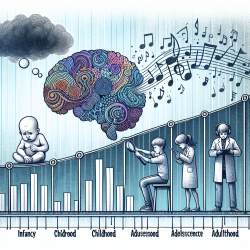Introduction
The COVID-19 pandemic has brought unprecedented challenges to mental health, particularly affecting individuals with pre-existing conditions such as obsessive-compulsive disorder (OCD) and health anxiety. The research article "A Perfect Storm? Health Anxiety, Contamination Fears, and COVID-19: Lessons Learned from Past Pandemics and Current Challenges" provides valuable insights into these challenges. This blog aims to explore how practitioners can leverage these insights to enhance their skills and create better outcomes for children, especially in the context of online therapy services like those provided by TinyEYE.
Understanding the Psychological Impact of Pandemics
Past pandemics, such as the Swine Flu, Zika, and Ebola, have demonstrated the psychological toll that disease outbreaks can have. The research highlights the role of belief-based cognitive variables, transdiagnostic processes, social factors, and environmental variables in exacerbating health anxiety and contamination fears. Understanding these factors is crucial for practitioners working with children who may be experiencing heightened anxiety during the COVID-19 pandemic.
Key Insights for Practitioners
- Belief-Based Cognitive Variables: Cognitive models suggest that dysfunctional beliefs and interpretations contribute to anxiety. Practitioners can focus on identifying and addressing these beliefs in children to alleviate excessive anxiety.
- Transdiagnostic Processes: Factors such as intolerance of uncertainty and anxiety sensitivity are linked to pandemic-related anxiety. By developing interventions that target these processes, practitioners can help children manage their anxiety more effectively.
- Social and Environmental Factors: The perception of social support and media consumption can significantly influence anxiety levels. Encouraging positive social interactions and guiding children in consuming reliable information can mitigate anxiety.
Implementing Research Insights in Practice
For practitioners providing online therapy, incorporating these research insights can enhance the effectiveness of interventions. Here are some strategies:
- Customized Cognitive-Behavioral Therapy (CBT): Tailor CBT approaches to address specific cognitive distortions and beliefs related to contamination and health anxiety.
- Building Resilience: Encourage resilience-building activities that help children cope with uncertainty and develop adaptive responses to anxiety triggers.
- Parental Involvement: Engage parents in the therapeutic process to create a supportive environment and reinforce positive behaviors at home.
Encouraging Further Research
While the current research provides valuable insights, there is a need for ongoing studies to explore the long-term psychological effects of COVID-19 on children. Practitioners are encouraged to stay informed about emerging research and consider participating in studies to contribute to the growing body of knowledge in this field.
Conclusion
By leveraging the insights from the research on health anxiety and contamination fears, practitioners can enhance their skills and provide effective support to children during the COVID-19 pandemic. As we continue to navigate these challenging times, data-driven decisions and evidence-based practices will be essential in creating positive outcomes for children's mental health.
To read the original research paper, please follow this link: A Perfect Storm? Health Anxiety, Contamination Fears, and COVID-19: Lessons Learned from Past Pandemics and Current Challenges.










